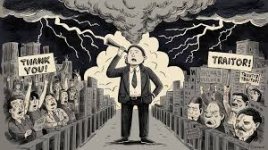In the complex world of politics, the question of whether whistleblowers should be protected or prosecuted sparks fierce debate. Whistleblowers are individuals who expose wrongdoing within organizations, often at great personal risk. Their actions can reveal corruption, abuse of power, or illegal activities that otherwise remain hidden from public scrutiny. Yet, governments and corporations often view them as traitors or threats to national security. So, who is right? Should whistleblowers be hailed as defenders of transparency, or punished as lawbreakers?
On one hand, whistleblowers serve a critical role in maintaining accountability. Without their courage, scandals like Watergate, the Panama Papers, or more recent leaks exposing government surveillance might never come to light. Protecting whistleblowers encourages employees and insiders to come forward without fear of retaliation, promoting a culture of honesty and responsibility. In democracies, transparency is a cornerstone of public trust, and whistleblowers help uphold that trust by shining light into dark corners.
However, the opposing view argues that whistleblowers can jeopardize national security and organizational integrity. Leaking sensitive information—whether classified government secrets or corporate data—can endanger lives, disrupt diplomatic relations, or cause financial harm. Critics insist that whistleblowers bypass legal channels, undermining proper procedures designed to handle internal disputes confidentially. They warn that indiscriminate leaks could lead to chaos, making organizations less secure and less effective.
The reality lies somewhere in between. Blanket prosecution of whistleblowers risks silencing critical voices and enabling corruption. Conversely, unrestricted protection could incentivize reckless disclosures without regard for consequences. The solution is a balanced approach: establish clear legal protections for those who report genuine wrongdoing through proper channels while holding accountable those who intentionally leak information recklessly or with malicious intent.
Countries around the world are gradually adopting whistleblower protection laws, recognizing their vital role in democratic governance. Still, implementation and enforcement remain inconsistent, with many whistleblowers facing harassment, job loss, or even imprisonment. Protecting whistleblowers is not just about safeguarding individuals; it is about preserving the very fabric of democracy and justice.
In the battle between secrecy and transparency, whistleblowers stand on the frontline, reminding us that truth should never be silenced.
On one hand, whistleblowers serve a critical role in maintaining accountability. Without their courage, scandals like Watergate, the Panama Papers, or more recent leaks exposing government surveillance might never come to light. Protecting whistleblowers encourages employees and insiders to come forward without fear of retaliation, promoting a culture of honesty and responsibility. In democracies, transparency is a cornerstone of public trust, and whistleblowers help uphold that trust by shining light into dark corners.
However, the opposing view argues that whistleblowers can jeopardize national security and organizational integrity. Leaking sensitive information—whether classified government secrets or corporate data—can endanger lives, disrupt diplomatic relations, or cause financial harm. Critics insist that whistleblowers bypass legal channels, undermining proper procedures designed to handle internal disputes confidentially. They warn that indiscriminate leaks could lead to chaos, making organizations less secure and less effective.
The reality lies somewhere in between. Blanket prosecution of whistleblowers risks silencing critical voices and enabling corruption. Conversely, unrestricted protection could incentivize reckless disclosures without regard for consequences. The solution is a balanced approach: establish clear legal protections for those who report genuine wrongdoing through proper channels while holding accountable those who intentionally leak information recklessly or with malicious intent.
Countries around the world are gradually adopting whistleblower protection laws, recognizing their vital role in democratic governance. Still, implementation and enforcement remain inconsistent, with many whistleblowers facing harassment, job loss, or even imprisonment. Protecting whistleblowers is not just about safeguarding individuals; it is about preserving the very fabric of democracy and justice.
In the battle between secrecy and transparency, whistleblowers stand on the frontline, reminding us that truth should never be silenced.

